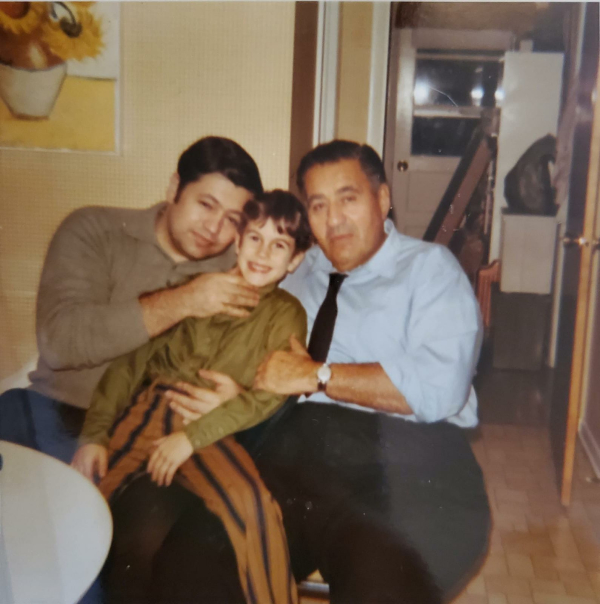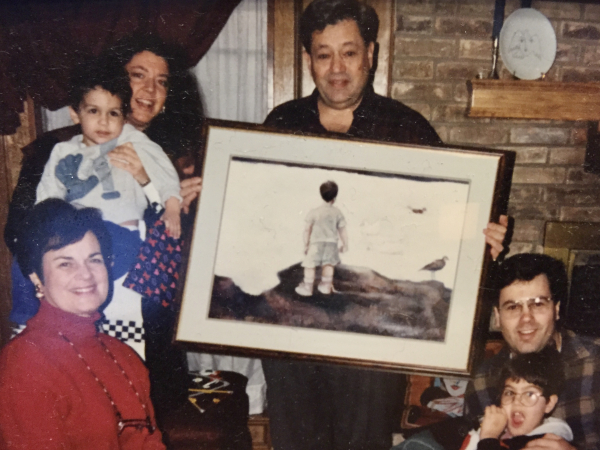Happy Father's Day!
Both of my children are adults now. It's strange to consider them fully-functioning autonomous adults – because I remember their childhood like it was yesterday (like worrying whether the soft spot on their heads would ever fill in and harden up, or if they'd ever stop sleeping with a nightlight).
Today, they're men doing great things, and I get to be proud of them. I also get to be proud of my role in their growth and proud of passing down the wisdom of my dad, and his father, and the rest who came before me.
It has been 20 years since my father died ... Crazy how time flies! He was my best friend and an amazing mentor. His vision for what I could become helped shape and inform my goals, my accomplishments, and yes, me.
For example, after winning the State Championship in the shot put, my dad came down from the stands onto the field. He hugged me and told me that he knew I could do it. Then, he looked deeply into my eyes and asked whether I was a little disappointed? "Disappointed?" I asked. "But, Dad, I won." He looked at me and said, "Winning is great ... but you didn't throw a personal best." He was proud, and he loved me. He recognized that winning was important ... but he wanted to remind me that the other throwers weren't my real competition.
In life, to be and do your best, the competition is really with yourself; and we both knew I could do better.
My Dad believed in setting high standards. He taught me that most people's lives are defined by their minimum standards. Why? Because once those standards get met, it is easy to get distracted and complacent.
One of his favorite sayings was, "The difference between good and great is infinitesimal." This applies to many things. For example, people who are good take advantage of opportunities; people who are great create them.
As time goes on, I recognize how much of my Dad is in me. And, likewise, how much his father was a part of him ... and how parts of all of us have somehow become a part of my children.

Me, my dad, and grandfather
My Impact on My Children
I hope I've imparted many important lessons to my children - but one of the most impactful lessons was teaching them to enjoy reading.
Some parents try to limit the amount of time their kids spend watching TV or playing video games. I tried something different. Instead, my kids earned their games by reading books. And, they also received more books in the process.
Here's how it worked.
When they finished a book, it was their right, and my obligation, to take them to the bookstore for us to pick up the next book together. Likewise, when they finished ten books, it was their right, and my obligation, to take them to the computer store or game store for them to choose any game they wanted.
When they finished a hundred books, they earned a game system.
There came a point when I wanted one of my sons to start reading grown-up books. He was comfortably reading a particular genre (teen fiction) and didn't want to read the kind of books that I thought he was ready to read (and might enjoy more). So, I created a bonus system that counted a specific book (it might have been a Tom Clancy novel) as three books. I didn't force him; I just let the easier path to a reward "whisper" in his ear what to read. Once he finished that, he never went back to teen fiction.
As they started to get into their teenage years, I needed to up the ante a little. So, 500 books meant they got a laptop of their choice. Both boys cashed in and probably felt like they were taking advantage of their dad.
So, Who Got the Better Bargain?

Three generations of Getsons
Fortunately, in child-rearing, everyone can win. My sons love reading to this day - and have learned that they can accomplish anything they set their minds to... one step at a time.
My sons weren't ever forced to stop watching TV, or read a certain type of book, and always had endless things to keep them entertained.
Win-win.
I like to think each generation becomes better (as people and parents) due to the cumulative experience of the generations that came before them.
We stand on the shoulders of giants.
I look forward to seeing how my (eventual) grandchildren turn out, and how little pieces of me and their great-grandfather show up.
Hope you had a great weekend.
Language Is A Limitation
Words are powerful. They can be used to define reality, obscure reality, or create reality. Words can be constructive or destructive ... uplifting or demoralizing.
In a sense, the power of words is seemingly limitless. But that power cuts both ways. Language is also the cause of many of our problems.
We created language to aid social interactions and to facilitate our understanding of the world. However, language also remains a constraint in how we perceive the world and a limitation on our understanding of new things (e.g., ideas, advances in technology, etc.).
Before I go into where language fails us, it’s important to understand why language is important.
Language Facilitates Our Growth
Language is one of the major keys to advanced thought. As infants, we learn through watching our environment, reading faces, and learning to infer things from body language. As we begin to understand "language," our brains develop faster. In this context, language isn't limited to the spoken word – intelligence grows with the catalyst of language, whether it's vocalized or not.
It's this ability to cooperate and share expertise through language that has allowed us to build complex societies and advance technologically – but it is becoming an increasingly inadequate tool as the world becomes more complex.
Language as a Limitation
In Buddhism, there's the idea of an Ultimate Reality and a Conventional Reality. The Ultimate Reality is the objective nature of something, and the Conventional Reality is tied inextricably to our cognition – heavily influenced by our language.
Language conveys cultural values and biases, personal values and biases, and influences how we perceive “reality.” Linguistic differences create a wedge between various political groups – even when people probably want similar things. In these cases, differences in language and perception create strife (rather than define it).
We use language and our past to sift and categorize existence into heuristics instead of exploring the true nature of things (in part because if you're trying to survive in the jungle, shortcuts increase your chance of survival by saving time and energy ... and accuracy is secondary to survival).
On the other hand, when you're trying to expand the breadth and depth of humanities' capabilities, those same heuristics become shackles (or at least blinders). Ultimately, they can lead to issues like groupthink and echo chambers that limit not only innovation but communication.
Look at groups like Democrats v. Republicans or Israelis v. Palestinians. In reality, there are more similarities than differences. Nonetheless, on a day-to-day basis, each of them focuses more on their differences than finding collaborative solutions for life's tougher problems (or focusing on the things they do agree upon).
Throwing rocks at our enemies also counterintuitively makes us feel better and promotes in-group unity. The problem is it comes at the cost of progress and true unity.
This is not to say that there aren't real (and important) differences between those groups. It simply recognizes that part of the problem is our willingness to accept "get-to-next" compromises rather than seeking understanding and committing to coming up with real and complete solutions.
Humans Are The Real Black Box
People often refer to Artificial Intelligence as a "black box" - because the complexity and coding of the algorithms, etc. make it mysterious to a layman. But, Artificial Intelligence is programmed; it is precise and predictable. It is only influenced by the coding used to create it and the data fed to it; this creates its own form of transparency (and bias).
Meanwhile, humans are nuanced and (to some extent) non-rational creatures. We’re prone to cognitive biases, fear, greed, and discretionary mistakes. We create heuristics on previous experiences, and we can’t process information as cleanly or efficiently as a computer.
When humans explain their own behavior, they’re often inaccurate - what we hear is more likely a retrospective rationalization or confabulations than a summary and explanation of the choices they made.
All-in-all, it results in a lot of confusion in trying to understand world events, each other, and even ourselves.
Conclusion
I have friends on both sides of the political divide in America, and once you get past the rhetoric - there's a lot more in common than it seems. Excluding extremist groups, most are looking for unity, the "truth", and solutions to the problems in front of us.
Conflict is often a symptom, not the disease.
On a smaller scale, inside my company, I focus on creating a universal lexicon for our "intellectual shortcuts" because alignment starts with shared understanding. If the language I'm using means something else to another team member, even if we think we're moving toward the same goal, we'll slowly stray further and further apart.
As a practical matter, spending too much time moving away from each other (or measuring the distance we are from each other) creates a self-fueling irritation that becomes increasingly annoying, and ultimately caustic.
Today's problems can't be fixed purely with semantics and semiotics, but they are not bad places to start.
If we start from a place of agreement and common desire to pursue something worthwhile, the distinctions will call us forward rather than pull us apart.
I hope this helps. Let me know what you think!
Posted at 04:51 PM in Books, Business, Current Affairs, Healthy Lifestyle, Ideas, Market Commentary, Personal Development, Science, Trading Tools, Web/Tech | Permalink | Comments (0)
Reblog (0)